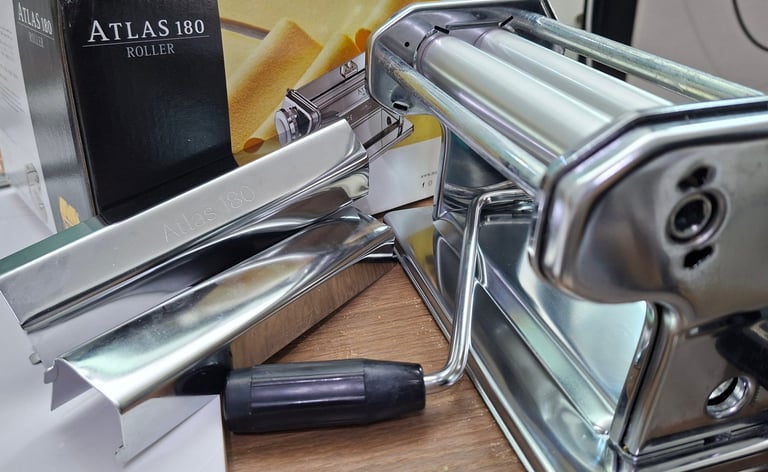Upgrading to a Pasta Machine for Polymer Clay
When I first tried polymer clay, I didn’t realize how important proper conditioning and even rolling were for great results. Using basic tools felt slow and tiring, and my clay sheets never came out quite right.
I started with an acrylic roller, then upgraded to a cheap pasta machine — it worked at first, much faster and easier to use. But after just a short time, I ran into a major issue: the bottom scraper blade snapped.
As someone based in Thailand, I import 100% of my polymer clay from abroad, including brands like Sculpey Premo, Soufflé, and Cernit, I’ve never experienced the common issue some people face with soft clay leaching plasticizers. Instead, all my clay tends to be quite firm, with some batches even very hard and dry. Because of this, a pasta machine is absolutely essential for me — it saves my hands and makes conditioning and rolling so much smoother and faster.
As I became more serious about polymer clay, I realized it was time to invest in a tool that could support consistent, professional results. After some research and hearing so many good things in the community, I chose the Marcato Atlas 180 Roller — and honestly, I haven’t looked back since.
Why the Atlas 180?
The Marcato Atlas 180 is originally a pasta machine, but it’s become a favorite among polymer clay artists for good reason:
Smooth and Consistent Rolling
The rollers are high-quality and provide a beautifully even sheet every time.Wide 180mm Roller
The standard 150mm version works just as well, but the 180mm roller is especially helpful for larger slabs or when working with multiple colors at once. The extra width lets me dedicate one side to dark, vibrant clay and the other to light or white clay—helping prevent any unwanted color transfer. It gives me more control (and peace of mind), especially during longer sessions.Durable and Well-Built
This machine feels sturdy and solid — it’s built to last. No wobbly parts or sudden crank failures.Precise Thickness Settings
The dial offers multiple settings, making it easy to adjust the thickness to suit each project. Thinner settings work well for delicate or lightweight pieces—and they also help reduce issues like clay sticking to cutters. I go thicker when I want embossing details to really stand out. Being able to control the thickness like this really helps tailor each piece to the look I’m going for.
Things You Might Want to Know
If you’re considering upgrading to a pasta machine for polymer clay, here are a few helpful notes based on my experience:
Dedicated for clay use only
Once used with polymer clay, it should never be reused for food.I don’t use a motor (just yet)
I currently hand-crank everything, and it works great. But if I ever start working in larger batches, I might consider adding a motor in the future.Use the clamp — highly recommended
I always secure the machine to my table using the clamp, and I strongly recommend doing so. It makes the rolling process much easier, steadier, and more efficient.Cleaning is Essential
Separating colors on the roller helps, but it only works well if the roller stays clean. In polymer clay work, color switching happens all the time. To avoid contamination between colors, keeping your machine clean is a must. I’ve removed the fenders (the side covers near the rollers) to make cleaning easier. I use baby wipes to clean both the rollers and the blade — and this helps keep each color clean and crisp.
If you're starting to take polymer clay seriously, I highly recommend upgrading to a sturdy pasta machine. It doesn’t have to be top-of-the-line, but it should be durable enough for regular use. Consider your budget and workspace size — there are many brands and models ranging from basic to advanced, so you can find one that fits your needs and price range.
Look for features like adjustable thickness settings that suit your style — whether you prefer ultra-thin sheets for delicate earrings or thicker ones for bolder designs. Easy cleaning and a sturdy build are also important, especially if you'll be using the machine often. Good customer support or a warranty is a nice bonus. In the end, what matters most is finding a machine that fits your workflow and makes the creative process more enjoyable.


Stay in the loop — promos, sneak peeks & little clay joys await.
© 2025 ClayLody • All rights reserved • Secure checkout via Stripe 🔒
Quick Links
